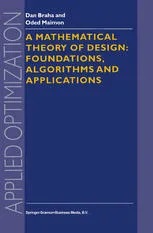A Mathematical Theory of Design: Foundations, Algorithms and Applications
4.5
Reviews from our users

You Can Ask your questions from this book's AI after Login
Each download or ask from book AI costs 2 points. To earn more free points, please visit the Points Guide Page and complete some valuable actions.Introduction to "A Mathematical Theory of Design: Foundations, Algorithms and Applications"
"A Mathematical Theory of Design: Foundations, Algorithms and Applications" by Dan Braha and Oded Maimon is a groundbreaking work that bridges the gap between design theory, computational algorithms, and practical applications. This book introduces a rigorous mathematical framework to analyze and optimize the complex process of design, providing valuable insights for industries and academia alike. Driven by the interplay of systems theory, artificial intelligence, and decision-making principles, the book delivers a structured approach to understanding both the art and science of design.
Design, as a practice, has long been rooted in creative and intuitive processes. However, in today’s rapidly evolving technological and industrial landscapes, there is an increasing need to address design challenges with analytical methods that bring clarity, efficiency, and innovation. Braha and Maimon take this challenge head-on by offering a comprehensive theoretical framework that unveils the intricate dynamics of design processes through mathematical modeling and computational methods.
Detailed Summary
At its core, "A Mathematical Theory of Design" redefines how we approach the design process. It presents a multidimensional perspective that spans theoretical foundations, advanced algorithms, and real-world applications. The book explores a variety of topics, including graph theory, information theory, optimization, and AI methods, as they apply to design systems. It builds a robust mathematical backbone for analyzing different phases of design, such as problem formulation, exploration of alternatives, evaluation of solutions, and implementation.
Structured in a logical sequence, the book begins by introducing fundamental concepts of design from a systems engineering viewpoint. It sets the tone by discussing the essential principles of structure, behavior, and function and how these concepts interplay within any design process. Subsequent chapters delve deeper into how specific algorithmic tools and mathematical strategies can streamline these interactions, enabling the design of large-scale and complex systems with higher efficiency and performance.
As the book progresses, readers are introduced to cutting-edge algorithms and computational techniques that solve design problems in unique and innovative ways. These methods are accompanied by illustrative examples and case studies, making the concepts easily accessible to both researchers and practitioners. The authors also highlight the interdisciplinary nature of design, demonstrating how their mathematical framework can be applied across domains, from manufacturing and product design to artificial intelligence and software engineering.
Key Takeaways
- Understand a formal, mathematical theory for complex design processes.
- Learn practical algorithms for optimizing design decisions and systems.
- Explore the integration of artificial intelligence into design methodologies.
- Gain insights into how systemic thinking applies to design challenges.
- Broaden your perspective on interdisciplinary applications of design theory across various industries.
Famous Quotes from the Book
"Design is not merely problem-solving—it is a dynamic process of exploration, evaluation, and synthesis."
"The integration of computation and mathematics into design is not a replacement for creativity; it is an enabler of innovation."
Why This Book Matters
With the increasing complexity of modern systems, from autonomous vehicles to large-scale manufacturing operations, traditional approaches to design can fall short in addressing the demand for precision, adaptability, and innovation. This book matters because it empowers professionals, researchers, and students with the tools to tackle real-world design challenges rigorously and confidently.
By bringing together mathematical rigor and computationally efficient methodologies, the authors offer a paradigm shift in how we conceptualize and implement design systems. Their work has paved the way for future advancements in design science, fostering a deeper understanding of how structured thinking and creativity coexist to drive technological progress.
Whether you are an engineer, scientist, or strategist, "A Mathematical Theory of Design" provides a timeless framework that equips you to confront the challenges of complex design environments and foster groundbreaking advancements in any domain.
Free Direct Download
You Can Download this book after Login
Accessing books through legal platforms and public libraries not only supports the rights of authors and publishers but also contributes to the sustainability of reading culture. Before downloading, please take a moment to consider these options.
Find this book on other platforms:
WorldCat helps you find books in libraries worldwide.
See ratings, reviews, and discussions on Goodreads.
Find and buy rare or used books on AbeBooks.


